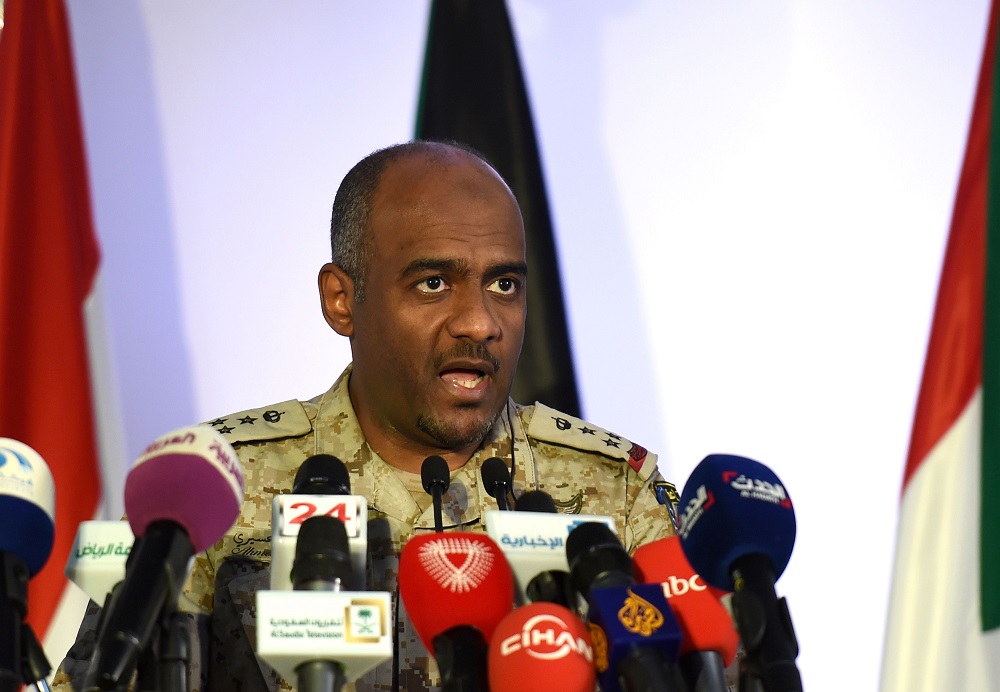London – Spokesman of the Saudi-led Arab coalition Brigadier General Ahmed al-Asiri stated that Yemen’s Hodeidah port city is the most important portal for weapons smuggling in Yemen.
He declared to Asharq Al-Awsat: “The Coalition will not stand idly by over this issue.”
He explained that intelligence reports confirmed that Hodeidah is being used for smuggling by Iran, adding: “Western countries have strived to keep the port under Houthi control under the excuse of maintaining food and medicine shipments, but the opposite has happened.”
Asiri remarked that a United Nations measure to search ships in nearby Djibouti ahead of their arrival in Hodeidah is “useless” because it has not stopped the smuggling.
He revealed that the Coalition has suggested to the UN that monitors be dispatched to the port, “otherwise we will mobilize and seize it.”
This request has been refused “probably out of its lax approach in fulfilling its duties in Yemen and in order to avoid getting embroiled in disputes with the Houthis.”
“I have not seen a UN report that details relief work. I have only seen vague ones. They have not spoken about the situation in Hodeidah, especially when keeping in mind that legitimate and Coalition forces are not present there. Who is then obstructing humanitarian work? The answer is known, but we do not read that in UN reports,” he lamented.
“Even if the smuggling ends, the port should return under the control of legitimate powers, not the militia. We have complied with demands to leave Hodeidah under Houthi control and we did not have to prove that arms, not medicine and food aid, were being sent to it. This has been attested to by all sides and that is why we will take action,” asserted the spokesman.
Addressing statements that the Coalition offensive in Yemen has “gone on for a long time,” he remarked: “There is no military plan in the world that can give you a deadline to when operations will end.”
He gave the example of the recent war in Afghanistan, noting that the situation there has been unstable for over 15 years. The same could be said of Iraq that has been living in instability since 2003, he added.
“We cannot leave Yemen in a gray zone. No one wants to see the country turned into another Libya … This is not the purpose of the Arab Coalition that seeks to back legitimacy in Yemen.”
“Military operations in Yemen will end when the coup forces commit to the UN resolution, the Gulf initiative and the outcomes of the national dialogue,” he emphasized.
He acknowledged that “reputations have been tarnished and time has been wasted,” but this is all for the “interest and stability of Yemen.”
This also ensures the security of neighboring Saudi Arabia, Asiri stressed.
“We therefore cannot abandon Yemen. Our keenness on the country means that we will not leave it to the coup militias or to vacuum that will be exploited by any terrorist organization. The stability of Yemen is a primary goal and its stability ensures the stability of the region,” he added.
The Coalition spokesman went on to say that coordination is ongoing to that end with the United States and United Arab Emirates.
Commenting on accusations that Saudi Arabia “has destroyed Yemen,” Asiri said: “The word ‘destroyed’ is an exaggeration. Military operations are underway and they necessitate taking measures against infrastructure.”
“These accusations are baseless. We are humans and we have values. We are not punishing civilians because of the militia. We are in Yemen to help the Yemeni people against this militia.”
“The activists who shed tears over Yemen are doing so from their houses in London or Berlin or Geneva. We welcome whoever goes down to the ground and writes about the reality there. Unfortunately, the majority who write these rights reports do so from their offices and they have nothing to do with the reality,” said the brigadier general.
“I do not think that anyone cares about Yemen as much as Saudi Arabia does. Several Saudis are of Yemeni origin. There are ties with Yemen that cannot be understood by rights activists,” Asiri stated.
